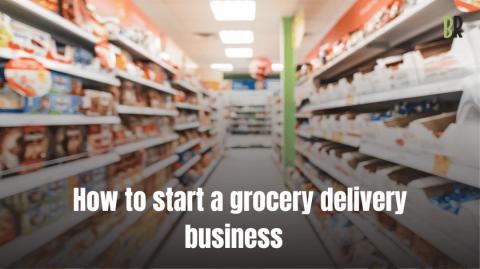
How to start a grocery delivery business
Launching a grocery delivery business can be a fulfilling adventure, but it's essential to approach it with a well-thought-out plan. In this guide, we'll take you through the fundamental steps to kickstart and expand your very own grocery delivery business. Whether you're looking to serve everyday residential customers or assist commercial clients with bulk orders, this guide will provide you with the practical insights and strategies you need. So, let's dive in and explore the world of grocery delivery entrepreneurship, where opportunities abound, but success relies on careful planning and proactive steps.
Choosing Your Customer Base:
The first crucial decision when considering how to start a grocery delivery business is selecting your customer base. This choice will shape your business model and determine your path to success. To make an informed decision on how to start a grocery delivery business, take these factors into account:
Product and Service Offering: Define the products or services you will provide. Are you targeting busy individuals, the elderly, or those who need personalized assistance? Alternatively, are you focusing on businesses that require bulk inventory deliveries?
Target Market: Identify your target market. Decide whether you want to serve residential customers or commercial clients, such as grocery stores, mini markets, or supermarkets.
Resource Allocation: Assess the resources you can allocate in terms of time and capital. This evaluation will help you refine your options and make informed choices.
For Residential Grocery Delivery:
If you choose to serve residential customers, there are effective strategies to attract and retain clients as you embark on your journey of how to start a grocery delivery business:
1. Partner with Local Supermarkets:
Forge partnerships with supermarkets in your delivery areas. Offer a seamless solution where customers can place orders directly with the supermarket, and you pick up and deliver their groceries. Supermarkets benefit from increased sales and improved customer satisfaction, while you earn a delivery fee.
2. Challenges: you may face
Parking Tickets: Be mindful of parking challenges, particularly in urban areas, and budget for potential parking costs.
Helper: Consider enlisting assistance for handling numerous bags or dealing with complex delivery situations.
Delays: Prepare for potential delays caused by customers inspecting items, missing bags, or misplacing receipts. Implement a system to minimize errors and delays.
For Commercial Bulk Grocery Delivery:
If your vision for how to start a grocery delivery business leans toward serving commercial clients, your services can provide essential support to businesses in need of bulk inventory replenishment:
1. Offer Efficient Solutions: Position your business as a solution provider for businesses, including grocery stores, that often require help in procuring inventory from wholesalers. Focus on efficient inventory management and delivery services.
2. Pricing Strategy: Determine a competitive fee structure, which can be a flat rate or a percentage of the total order amount. Consider starting with lower fees to establish your presence and gradually increase rates as your business grows
3. Challenges:
Vehicle Size: Invest in suitable vehicles capable of handling bulk orders efficiently to avoid unnecessary trips and potential loss of clients.
Heavy Lifting: Be prepared for physically demanding work, which may involve loading and unloading heavy items.
Time Management: Anticipate longer processing times initially as you familiarize yourself with wholesalers and their inventory layouts. With experience, your efficiency will improve.
Essential Must-Haves for Your Grocery Delivery Business:
To run a successful grocery delivery business, ensure you have these essential components in place:
Separate Business Line: Use a dedicated phone number for your business to separate personal calls from business inquiries.
Business Cards: Create professional business cards to distribute and promote your services.
Legal Entity: Consider establishing a legal entity such as an LLC or corporation to protect your personal assets and meet wholesale requirements.
Website: Develop a website to market your business and showcase the services you offer. Consider adding it to your delivery vehicle for increased visibility.
In conclusion, starting a grocery delivery business offers significant potential for growth and profitability. However, success requires meticulous planning and addressing the unique challenges of your chosen customer base. Whether you decide to serve residential or commercial clients, proactive problem-solving, strategic partnerships, and professionalism will be key to building a thriving and sustainable business. Ultimately, your dedication and strategic approach will determine your success in establishing a loyal customer base and growing your business for the long term.




